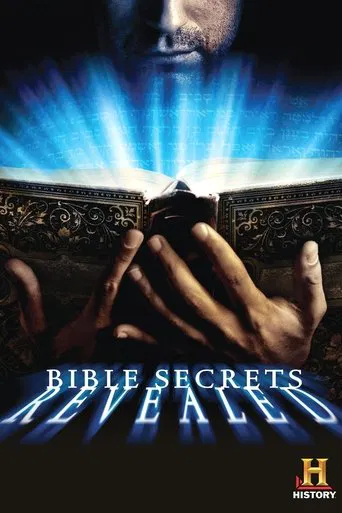

ridiculous rating
... View MoreLet's be realistic.
... View MoreDon't listen to the Hype. It's awful
... View MoreClever and entertaining enough to recommend even to members of the 1%
... View MoreI share the same view as previous comments made. Though a lot of facts are presented.. Seeds of doubt are also being put in the ground. Do not base your faith on the people around Jesus but on the Saviour Himself Have faith in God. God is Light and in Him there is no darkness. His timing is perfect. He was there at the time of the star of Bethlehem He was born in pure form. Unless one become born again you cannot see the kingdom. Guard your heart whilst watching this program. For the most of the part you get the feeling like commentator is questioning or even speaking his knowledge above the written Word of God. Thats the feeling i got from it
... View MoreIn this documentary, the narrator does say "believe it or not" more than once—and the rest of the title above more than once, but I doubt that anyone who made this series really believes that the Bible was inspired by God. No apologists for orthodox Christianity were seriously consulted in the making of this series. They shouldn't have to be, but even though I agree with the program's skepticism, I noticed that an entire POV on this subject was glaringly missing.This program interested me because this is a topic I have studied, but I found the whole approach of the series rather Gee Whiz and often misleadingly truncated. For example, it is not just that a Gnostic gospel having Jesus separated into two during the crucifixion is trying to tell us to focus less on the crucifixion itself; it goes deeper and into more complex areas than that suggests. It entirely denies the significance of Jesus' suffering as understood by orthodox Christianity. Docetism is the heresy of saying that Jesus was not fully human AND fully God but rather he was a man inhabited by God and therefore the two are separable. This was not explained even though some of the talking heads recruited for this show (e.g., Elaine Pagels and Bart Ehrman) could have talked authoritatively about this kind of issue. What "Gnostic" means—and who was and wasn't Gnostic—is also more complicated than this series conveys. Instead, the series goes for the quick and sensational story line.Other issues looked as if they were about to be given similar short shrift but were not—almost. The issue of what Jesus and his contemporaries meant by the term "messiah"—and what they expected the messiah to be like—was at first introduced as if the term was synonymous with "son of God" in the sense that it is usually understood in orthodox Christianity, but, subsequently, the subject was discussed—if not fully—at least enough to indicate that it is more complicated than that. Indeed, if the viewer pays attention, the series does make it clear that Jesus' own words are not always clear as to what he thought of himself. His actions, if New Testament accounts are even remotely accurate, might speak louder than words, but the series fails to point out that, for example, Jesus' driving the money-changers from the Temple, is given more weight as a sign of messiah-ship and as a reason for his crucifixion in Matthew, Mark and Luke than in John where the raising of Lazarus is emphasized. The choice of people to be talking heads for this series is mixed at best. Elaine Pagels and Bart Ehrman are bona fide experts in this field, but while I know less about the qualifications of most of the others, I know that Reza Aslan, the author of "Zealot," wrote in his book that "gospel" is a Greek word (it is Old English). The mistakes and misrepresentations in his work keep coming after that. Fortunately, his thesis that Jesus advocated violent political revolution, in spite of evidence to the contrary, is not adopted by the series.BTW, the series DOES point out that Asherah, the Queen of Heaven, was later regarded as a pagan goddess, but it maintains that ORIGINALLY she was not separate from the worship of Yahweh.
... View MoreThis was from the History channel. I have watched several episodes so far, and this is NOT a Christian documentary. The show references many biblical scholars, but appears to have a slant towards discrediting the bible in every episode. It emphasizes inaccuracies or confusion about biblical text and traditions, but then takes biblical references out of context. For example, one episode discusses how there is a queen of heaven (and both a masculine and feminine side to God) and the show said the bible even references the 'queen of heaven'. I looked up the bible verses, and in context, the references to a queen of heaven were clearly referred to as an idol that people were worshiping. In no way does the bible infer in those verses that there is an actual queen of heaven, and anyone who reads this will see that. (Jeremiah 7:18 and Jeremiah 44:17-25).In episode 2, part of the show focuses on discrediting the exodus of the Jews out of Israel, and tries to establish doubt that there was ever even a true exodus, as well as tries to establish doubt that the promised land is actually a promised land for the Jews. Whatever your views are on this topic, just understand that this documentary focuses on discrediting the biblical concepts about any promised land.The most interesting aspect of this show is that if you look up the producer and main people in this show, they are all critical of nature of the bible! Check Wikipedia. Reza Aslan was raised Muslim, dabbled with Christianity, then converted back to Islam. How are we to get an unbiased review of the bible by someone who prefers the Koran? Then Robert Cargill was raised Christian, but has now decided that he can't support the bible as a literal source of history and is a professed agnostic. Bart Ehrman is also agnostic. Per Wikipedia, 'Ehrman's work focuses on textual criticism of the New Testament, the historical Jesus, and the development of early Christianity.' Other biblical scholars are interviewed as well, but most provide just snippets of details about historical or biblical knowledge.So watch this TV series with a grain of salt. Yes, there are some interesting concepts discussed, and we should actively research and study the bible and biblical history as well as the mysteries and conflicting details of the bible. BUT, this show does nothing but criticize the nature of the bible, and has a clear slant on discrediting any historical basis of the bible. You've been warned.
... View More